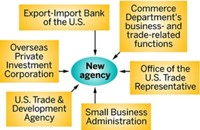Advertisement
Grab your lab coat. Let's get started
Welcome!
Welcome!
Create an account below to get 6 C&EN articles per month, receive newsletters and more - all free.
It seems this is your first time logging in online. Please enter the following information to continue.
As an ACS member you automatically get access to this site. All we need is few more details to create your reading experience.
Not you? Sign in with a different account.
Not you? Sign in with a different account.
ERROR 1
ERROR 1
ERROR 2
ERROR 2
ERROR 2
ERROR 2
ERROR 2
Password and Confirm password must match.
If you have an ACS member number, please enter it here so we can link this account to your membership. (optional)
ERROR 2
ACS values your privacy. By submitting your information, you are gaining access to C&EN and subscribing to our weekly newsletter. We use the information you provide to make your reading experience better, and we will never sell your data to third party members.
Policy
Fixing Regulations
Government: Moves will save $10 billion in five years, Obama Administration says
by Cheryl Hogue
August 29, 2011
| A version of this story appeared in
Volume 89, Issue 35

Government-wide efforts to eliminate and streamline regulations are being touted by the White House as a means to save the U.S. economy $10 billion over the next five years.
The plans, unveiled on Aug. 23, come in response to a directive from President Barack Obama earlier this year. The President ordered federal agencies to comb through regulations, weed out those that are outdated, and revamp others to promote economic growth and job creation (C&EN, Jan. 24, page 10).
Cass R. Sunstein, Obama’s regulatory gatekeeper in the Office of Management & Budget, told reporters at a briefing that agencies already have made or are close to implementing changes that will save $4 billion over the next five years. Efforts under way to make other changes will save another $6 billion over the same period, he said.
Some of these moves will affect the chemical enterprise. For instance, the Occupational Safety & Health Administration says its proposal to implement the United Nations system for managing chemicals will save employers millions by reducing steps needed in worker training and in labeling of chemicals.
The Environmental Protection Agency intends to switch from paper to electronic reporting of health and safety data for commercial substances and pesticides to reduce company costs. EPA will also evaluate why and by how much its cost estimates for regulations, calculated before rules are issued, differ from actual costs. The results could broadly affect rule-making at the agency.
The Food & Drug Administration plans to modernize its Good Manufacturing Practices for pharmaceuticals and foods. The changes will not directly cut costs but will provide public health benefits, the agency says.
Reaction to the plans was mixed. The U.S. Chamber of Commerce sees the White House’s effort as “worthy,” but it “will not have a material impact on the real regulatory burdens facing businesses today,” says William L. Kovacs, vice president of the business organization.
But Robert Weissman, president of Public Citizen, an activist group supporting tighter health and safety protections, says the Administration’s emphasis on unneeded rules only serves to support the Chamber of Commerce’s erroneous supposition that regulations damage the economy and impede job growth.





Join the conversation
Contact the reporter
Submit a Letter to the Editor for publication
Engage with us on Twitter